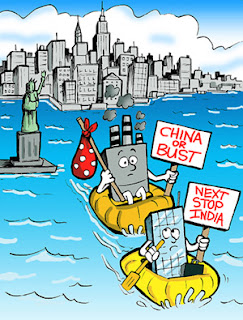Microsoft To Hire Thousands... In China
Microsoft the largest software maker, will hire several thousand workers in China to support new cloud computing services and smartphones using its Windows operating system, Chief Executive Officer Steve Ballmer said.
China has become the fastest growing market (MSFT) for the company’s smartphone operating system, Ballmer said. The Redmond, Washington-based company will start a public preview of its Windows Azure service in the country next month, making Microsoft the first multinational to offer public cloud computing in the nation.
“I visited China last about one year ago in May and it is remarkable to me how much has changed,” Ballmer, 57, said. “At Microsoft this is an incredibly exciting time.”
GM to Build Cadillac Plant in China
General Motors Co. said its Shanghai GM joint venture received permission from Chinese authorities to build an eight billion yuan ($1.3 billion) factory to manufacture its Cadillac brand, boosting the auto maker's ambition of becoming a larger player in China's booming luxury-car market.
Και, για να "ανταποδώσει τη χάρη", η Κίνα αποφάσισε και αυτή να επεκταθεί στην αγορά αυτοκινήτων της Αμερικής, πηγαίνοντας στο Ντιτρόιτ και αγοράζοντας εκεί αντιπροσωπείες, μηχανικούς, κι ότι άλλες εταιρίες θα τους βοηθήσουν σιγά-σιγά και διακριτικά να αναπτυχθούν:
"We've decided that the luxury market is going to grow and we want a bigger share," said Dayna Hart, a spokeswoman for GM in China.
Chinese Creating New Auto Niche Within Detroit
Chinese-owned companies are investing in American businesses and new vehicle technology, selling everything from seat belts to shock absorbers in retail stores, and hiring experienced engineers and designers in an effort to soak up the talent and expertise of domestic automakers and their suppliers.While starting with batteries and auto parts, the spread of Chinese business is expected to result eventually in the sale of Chinese cars in the United States.“The Chinese are well behind the Japanese when they hit our shores 30 years ago,” said David E. Cole, a founder of the Center for Automotive Research in Ann Arbor, Mich. “They lack the know-how, and they’re coming here to get it.”In contrast to the Japanese, Chinese auto companies are assiduously avoiding the spotlight. Last year, the biggest carmaker in China, Shanghai Automotive Industries, opened new offices in suburban Detroit without any publicity, which is almost unheard-of in an industry that thrives on media coverage.But China’s growth in the American auto industry is drawing notice in Washington. Last year, the Obama administration filed a complaint with the World Trade Organization that China’s government was unfairly subsidizing the production of some parts shipped to America. And the country’s inroads into American-made batteries and electric vehicles have drawn scrutiny because that sector of the industry has been heavily subsidized by the United States government.The American industry’s overall resurgence has drawn a growing Chinese population to Detroit, with Chinese-owned suppliers bringing executives from their country and American automakers adding new talent. About 50,000 Chinese, many of them engineers and other professionals who work at General Motors and the Ford Motor Company, live in the metropolitan area.In addition to Chinese companies locating in Detroit, a cottage industry of lawyers, accountants and corporate advisers has grown up to assist them. Their numbers are small now, but the impact of the Chinese on the local economy is slowly expanding.
"Κινέζοι καταναλωτές": Πριν μερικά χρόνια θα ακουγόταν περίπου ως ανέκδοτο, διότι δεν είχαν καθόλου λεφτά. Τώρα όμως τα πράγματα αλλάζουν, διότι και οι μισθοί ανέβηκαν λίγο, και οι εργάτες διεκδικούν ακόμα περισσότερα με κινητοποιήσεις, αλλά και η ίδια η Κίνα ως κράτος προωθεί τη δημιουργία μιας "μεσαίας τάξης" στο εσωτερικό της, για να καταναλώσει όλα αυτά που τώρα εξάγει στη Δύση (μιας και ο "δυτικός καταναλωτής" αδυνατεί πλέον να καταναλώσει όπως κατανάλωνε).
Εδώ βλέπουμε τα προβλήματα που δημιουργούνται κατά τη διάρκεια αυτής της "μετάβασης" για την Κίνα:
Αφήνει το νόμισμα της (γουάν) να αυξηθεί έναντι του δολαρίου που πληθωρίζεται, ώστε έτσι να αυξηθεί και η αγοραστική δύναμη των Κινέζων εργατών που πληρώνονται σε αυτά.
Επειδή όμως υπάρχουν πολλές επιχειρήσεις, ειδικά οι πιο μικρές, που βασίζονται μόνο στη φτηνή ισοτιμία του γουάν, ώστε να παράγουν εντελώς φτηνά προϊόντα, αυτές οι επιχειρήσεις έχουν πρόβλημα τώρα που το γουάν ανεβαίνει λιγάκι.
Rising yuan poses challenges for exporters
"...most exporters in the delta region have told us that the rising yuan value has led to a big profit decline," said Xiao, without elaborating on how much profits have declined. The People's Bank of China last week set the daily reference rate of the yuan against the dollar at 6.1980, the highest in 19 years.
"Yuan appreciation burdens most Chinese exporters heavily. We had to increase the price to make a sustainable business profit in the overseas market," Zhang said.
Οι Guns 'n' Roses είχαν κάνει μια περιοδεία με τίτλο "Chinese Democracy", όπου σατύριζαν το κινεζικό μοντέλο ανάπτυξης, με φουλ εκμετάλλευση του εργάτη, με λογοκρισία, με καταστολή, με ένα μόνο κόμμα να κυβερνά χωρίς καν τις αστικές εκλογές, κτλ, κτλ, κτλ. Που να ήξεραν όμως οι "καημένοι" οι Guns 'n' Roses ότι οι δυτικοί καπιταλιστές γουστάρουν αυτό το μοντέλο και το προωθούν όσο περισσότερο μπορούν και στις χώρες της Δύσης


No comments:
Post a Comment